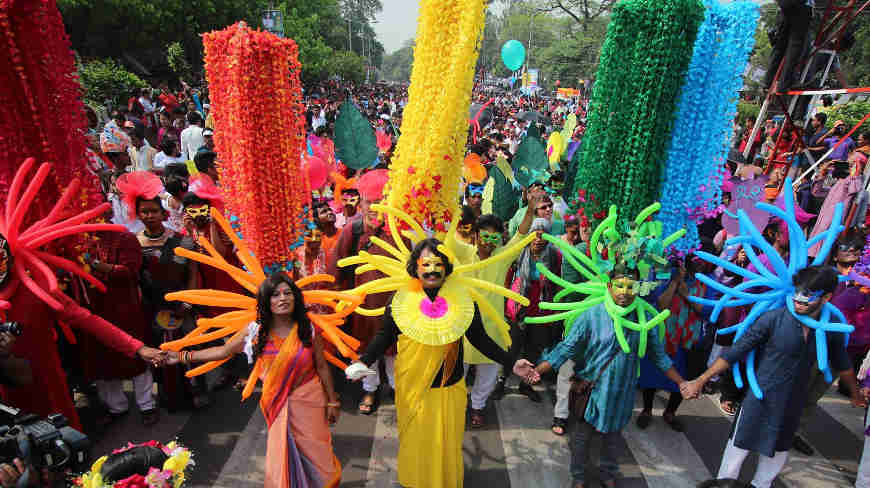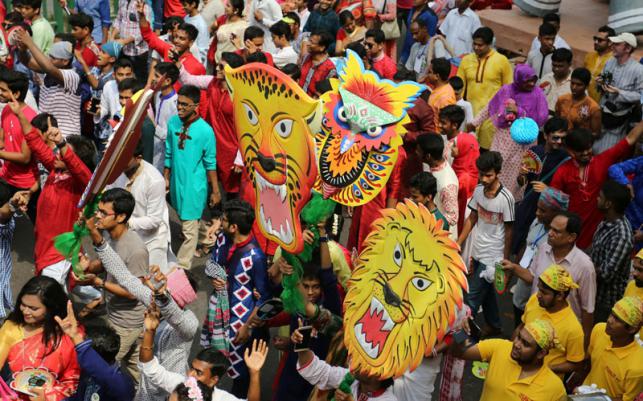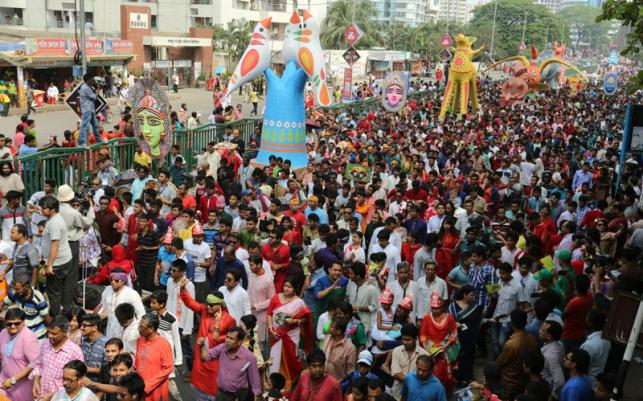Four arrests of LGBT activists at Bangladesh celebration
Colin Stewart is a 45-year journalism veteran living in Southern…

Police in Dhaka, Bangladesh, today arrested four LGBT rights activists taking part in a traditional procession to celebrate the Bengali New Year.
The march, known as Mongol Shobhajatra, celebrates Bengali New Year’s Day, or Pohela Boishakh.
Roopbaan, an LGBT rights organization in Bangladesh, had canceled plans for a “Rainbow Rally” that would promote tolerance for LGBT people as part of Pohela Boishakh celebration.

The Rainbow Rally, or Rangdhanu Jatra, was previously held in 2014 and 2015, but this year its organizers encountered opposition from Islamists, including a Facebook page that called for opponents to beat up parade participants.
The threats targeted more than just the Rainbow Rally, but also all of the traditional Bengali New Year celebrations, in which people wear garlands of flowers and carry animal masks. Hard-line Muslim opponents called the celebrations “un-Islamic and Haram (forbidden).”
AFP reported that the arrests occurred after 60 people showed up at the planned site of the Rainbow Rally:
“We’ve held them after they attempted to hold a Rainbow Rally in support of homosexuals,” local police chief Abu Baker Siddique told AFP.
“The rally did not have permission from Dhaka Metropolitan Police and the Dhaka University authorities,” he said.
He said the four were expected to be released in the evening.
“We did not hold the Rainbow Rally, although some 60 people came to the spot where we were scheduled to meet,” a Roopbaan organizer told AFP on condition of anonymity, adding he did not know why the four men were detained.
A leader of Roopbaan told the Dhaka Tribune that the group decided to scrap their rally this year although, until yesterday, they had vowed to hold it despite security fears and threats by Islamists who say the secular festival is un-Islamic. Authorities had approved Rainbow Rally celebrations in 2014 and 2015.
For security, Dhaka Metropolitan Police assigned extra personnel to protect the overall Pohela Boishakh festivities and prohibited people from wearing masks.

“We’ve banned on all sorts of open concerts and mass gatherings in open spaces after 5 pm but indoor programmes will be allowed,” Police Commissioner Asaduzzaman Miah said.
Participants were allowed to carry the traditional animal masks, but not wear them. They also were prohibited from wearing matching T-shirts or carrying potentially harmful items, including nail cutters and matchboxes.
Amid those security concerns, the Roopbaan leader said that Dhaka authorities had not issued a permit for the planned Rainbow Rally. The cancellation of the event was announced on Roopbaan’s Facebook page on Wednesday.
However, the leader told the Dhaka Tribune, LGBT rights campaigners participated in the traditional rally with normal dress, since “it is our right to celebrate Pohela Boishakh.”
After the four arrests, the Roopbaan leader said, LGBT activists talked with the officer in charge at the Shahbagh police station, but they were not allowed to meet with the arrestees.
AFP reported about the overall Mongol Shobhajatra festivities:
Police said thousands of officers would be deployed for the annual street parade and in central Dhaka, where traditionally hundreds of thousands of revellers swarm.
Authorities have banned outdoor evening concerts and masks, commonly worn during the new year parades, as part of increased security.
Police have also stepped up their hunt for Islamic militants as Bangladesh reels from a series of deadly attacks on religious minorities and foreigners in recent months.
In 2001 a new year bomb blast in Dhaka’s Ramna Park killed 10 people. Eight Islamist militants were sentenced to death for the attack.
One Bangladeshi LGBT rights activist who was not part of the events in Dhaka commented that activities such as the Rainbow Rally are needed to help Bangladeshi citizens understand the importance of the struggle for recognition of the human rights of LGBT people:
Bangladeshi people think LGBT rights activists are making people gay or converting people into so-called “gayism.” Most Bangladeshi think that gays are evil and the enemy of the state, religion and society. Most Bangladeshi think that LGBT rights activists are agents of the USA, Israel and Britain, etc.
Most people don’t have any idea of LGBT rights and even they don’t have any idea about sexual orientation, gender identity, STD/STI, HIV/AIDS, etc.
Under an occasionally enforced Bangladeshi law, consensual same-sex intimacy “shall be punished with imprisonment for life, or imprisonment … for a term which may extend to 10 years, and shall also be liable to fine.” That law is Section 377 of the Penal Code, which was originally imposed by the British Empire in the mid-19th Century in what are now the countries of Bangladesh, India and Pakistan.
Related articles:
- First third-gender person seeks Bangladesh public office (December 2015, 76crimes.com)
- Anti-gay Bangladesh protests target Nobel Prize winner (December 2014, 76crimes.com)
- Bangladesh newspaper urges repeal of anti-gay law (August 2013, 76crimes.com)
- Bangladesh: Lesbian couple arrested, risks life in jail (76crimes.com)
- Archive of this blog’s articles about Bangladesh



FYI is the law below copied from Bangladesh Penal Code
CHAPTER XVI
OF OFFENCES AFFECTING THE HUMAN BODY
Unnatural offences
377. Whoever voluntarily has carnal intercourse against the order of nature with any man, woman or animal, shall be punished with 2[ imprisonment] for life, or with imprisonment of either description for a term which may extend to ten years, and shall also be liable to fine.Explanation. Penetration is sufficient to constitute the carnal intercourse necessary to the offence described in this section.